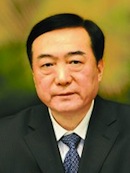 Name
Name
Chen Quanguo 陈全国
Current status
Xinjiang AR Party Secretary
Born
1955
Relevance to Tibet
Former TAR Party Secretary, Member of the 19th Politburo.
 Name
Name
Chen Quanguo 陈全国
Current status
Xinjiang AR Party Secretary
Born
1955
Relevance to Tibet
Former TAR Party Secretary, Member of the 19th Politburo.
Pronunciation: Chen Chwan-Gwoh soundbite
Born: 1955, Pingyu, Henan Province
Education: Masters in Economics from Zhengzhou University. Wuhan Automotive Polytechnic University.
Career: Rose through the CPC ranks in Henan Province, appointed Governor of Hebei Province in 2010. Party Secretary of the TAR from 2011 – 2016 then moved to Xinjiang.
Prospects: Promoted to the Politburo in October 2017; appears to be Xi Jinping’s “go to” hardliner, having made his name as such in the TAR.
Relevance to Tibet: Formerly Party Secretary of Tibet Autonomous Region.
Member of the 19th Politburo.
First job was in a factory making car parts. Joined the CPC in 1976.
Held fairly senior Party positions in various cities in Henan Province from 1988-1996, before becoming Acting-Mayor of Luohe City.
Completed Masters Degree in Economics in 1997.
Appointed Vice-Governor of Henan Province in 1998 whilst Li Keqiang was Governor and the two are thought to be close allies. Head of the Henan Province Organisation Department in 2000, overseeing the appointment of Party positions in Henan.
Promoted to Deputy Party Secretary of Henan Province in 2003, before being transferred to the same position in neighbouring Hebei Province in November 2009. Became Acting-Governor of Hebei Province in December 2009, just one month after arriving in the Province, was confirmed as Governor in 2010 (His predecessor was Hu Chunhua).
Appointed Party Secretary of the Tibet Autonomous Region in August 2011. See below for his role in implementing “stability management”.
Chen was Governor of Hebei during “Li Gang Gate” in October 2010, which became a major national scandal. A drunk driver, 22-year-old Li Qiming, knocked down two young students at Hebei University, one of whom later died from her injuries, and then attempted to get away. When he was apprehended he shouted “Sue me if you dare, my father is Li Gang!”, Li Gang being the Deputy Director of the local Public Security Bureau. Attempts by Communist Party officials and the Central Propaganda Department to suppress reports of the incident fueled national outrage. An independent investigation into Li Gang by Chinese internet users revealed that he owned 5 properties, which was far beyond the means of his police wages, strongly suggesting he was involved in corrupt and illegal activities. A few days after the incident, Governor Chen made a statement that “Li Gang Gate” had damaged the image of Hebei Province, and that he and his son should answer to their deeds in a court of law.
Hebei Province is home to around a quarter of China’s Catholics who have suffered significant persecution under the CPC. In November and December 2010, whilst Chen was Governor, Catholic clergy in Hebei came under pressure from Party officials to attend the government sanctioned National Congress of Catholic Representatives, which is opposed by the Vatican due to Party interference with the ordination of priests and bishops. Some members of the clergy were personally “escorted” to the congress or threatened if they refused to attend, whilst Bishop Joseph Li Liangui was warned he would be listed as a “wanted person” after he disappeared 2 weeks before. Chen Quanguo’s involvement in these events is unknown.
In October 2016 the South China Morning Post correctly speculated that Chen’s five years of hardline rule in the TAR had won him the trust of Xi Jinping and, already being an ally of Li Keqiang, made him a strong candidate to join the Politburo in 2017. The paper wrote: “As the only current regional party chief to have played leading roles in four separate provinces and regions – Henan, Hebei, Tibet and Xinjiang – Chen has a clear advantage over other Politburo contenders. Bo Zhiyue, a professor of Chinese politics at Victoria University in Wellington, New Zealand, said Chen’s appointment as party boss of Xinjiang had sent out a clear signal that he was destined for promotion to the Politburo at next year’s party congress.”